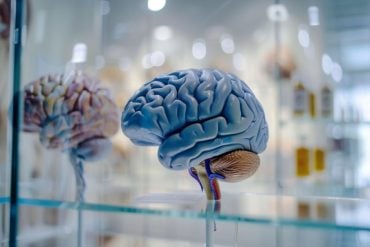Summary: Researchers studied the effects of THC, marijuana’s main psychoactive compound, on adolescent mouse brains.
The study found THC-induced structural changes in microglia, specialized brain immune cells, possibly aggravating a genetic predisposition to schizophrenia. The mice treated with THC showed a 33% higher reduction in microglial cells in certain brain regions compared to control mice.
These findings shed light on the potential risks of marijuana use in teenagers, especially those with a genetic susceptibility to psychiatric disorders.
Key Facts:
- The study discovered structural changes in the microglia of mouse brains exposed to THC during adolescence, which might worsen a genetic risk for schizophrenia.
- Mice with a certain genetic mutation exposed to THC showed a 33% higher reduction in microglia in the brain’s prefrontal cortex compared to normal mice.
- The genetically altered mice given THC scored 40% lower on social memory tests than their saline-treated counterparts.
Source: Johns Hopkins University
In a mouse study designed to explore the impact of marijuana’s major psychoactive compound, THC, on teenage brains, Johns Hopkins Medicine researchers say they found changes to the structure of microglia, which are specialized brain immune cells, that may worsen a genetic predisposition to schizophrenia.
The findings, published Oct. 25 in Nature Communications, add to growing evidence of risk to brain development in adolescents who smoke or eat marijuana products.
“Recreational and medical marijuana use is rapidly expanding in the United States and abroad, and teens are especially vulnerable to long-term negative effects of THC,” says Atsushi Kamiya, M.D., Ph.D., professor of psychiatry and behavioral sciences at the Johns Hopkins University School of Medicine.
“We know THC is psychoactive, and its concentration in marijuana plants has increased four times in the last 20 years, posing a particular danger for adolescents who are genetically predisposed to psychoactive disorders including schizophrenia.”
Microglial cells are a specialized subset of immune cells called brain-resident macrophages that are found in the central nervous system. They play a direct role in neuron-to-neuron communication, immune response and healthy brain development. In adolescence, microglial cells play a critical role in brain maturation related to social and cognitive function by synapse pruning and secreting of chemical transmitters.
Structural changes that interfere with them, the Johns Hopkins investigators suspected, may alter the brain’s wiring and messaging system in the still developing brains of teens.
To test their idea, researchers used genetically engineered mice with a mutation that mimics a genetic risk for psychiatric disorders in humans, along with normal mice as a comparison group. The mice carrying the mutation show changes to the brain with or without THC, specifically to the areas responsible for emotion, learning and memory.
During mouse adolescence, animals from both the genetically altered and normal groups were treated either with daily single injections of THC or with benign saline solution. After 30 days of injections, the mice were given three weeks of rest before behavioral tests were performed to assess their psychosocial development.
The tests included those involving odor sensing, object recognition, social interaction and memory. The researchers also used fluorescent staining to measure the number and morphology of microglial cells in the animals’ brains.
Results showed that mice exposed to THC had increased microglial apoptosis (programmed cell death), and the reduction in the number of microglia in mice with the genetic mutation and THC was 33% higher than in the normal mice with THC.
Microglial reduction was particularly present in the brain’s prefrontal cortex, which is responsible in both mice and people for memory, social behavior, decision making and other executive functions.
Because microglia are involved in brain neuronal maturation, a decrease in healthy ones may result in higher instances of abnormal cell signaling and communication, the researchers say. The genetically altered mice given THC in the study scored 40% lower on social memory than their counterparts given saline.
“This kind of study is critical right now because marijuana is becoming more mainstream, and we are just beginning to understand how it affects the brain immune cells,” says Yuto Hasegawa, Ph.D., research associate of psychiatry and behavioral sciences at the Johns Hopkins University School of Medicine and the study’s leading author.
Kamiya cautions that study results from genetically engineered mice cannot be applied directly to what happens in a human brain. But “studies in animals suggest there may be long lasting and negative effects of marijuana use during adolescence,” Kamiya says.
“More research is needed, but we strongly advise caution in marijuana use by teenagers,” Kamiya adds.
Researchers say the next step for these studies is to pinpoint exactly how microglial abnormality affects neuron function at the molecular level. From a clinical perspective, they hope to use these findings to explore how marijuana exposure contributes to schizophrenia and other psychiatric disorders.
Other scientists who contributed to this research are Solange Brown, Juhyun Kim, Samskruthi Madireddy, Yu Miyahara, Mizuho Obayashi, Akira Sawa, Gianluca Ursini, Feiyi Xiong and Xiaolei Zhu of the Johns Hopkins University School of Medicine and the Bloomberg School of Public Health, and Yan Jouroukhin, Beat Lutz and Mikhail Pletnikov of Johannes Gutenberg University.
All authors have no conflicts to disclose.
Funding: This research was supported by the National Institutes of Health, the Mitsui Sumitomo Insurance Welfare Foundation, the Brain & Behavior Research Foundation and the Korea Brain Research Institute.
About this mental health research news
Author: Kristen Crocker
Source: Johns Hopkins University
Contact: Kristen Crocker – Johns Hopkins University
Image: The image is credited to Neuroscience News
Original Research: Open access.
“Microglial cannabinoid receptor type 1 mediates social memory deficits in mice produced by adolescent THC exposure and 16p11.2 duplication” by Atsushi Kamiya et al. Nature Communications
Abstract
Microglial cannabinoid receptor type 1 mediates social memory deficits in mice produced by adolescent THC exposure and 16p11.2 duplication
Adolescent cannabis use increases the risk for cognitive impairments and psychiatric disorders. Cannabinoid receptor type 1 (Cnr1) is expressed not only in neurons and astrocytes, but also in microglia, which shape synaptic connections during adolescence.
However, the role of microglia in mediating the adverse cognitive effects of delta-9-tetrahydrocannabinol (THC), the principal psychoactive constituent of cannabis, is not fully understood.
Here, we report that in mice, adolescent THC exposure produces microglial apoptosis in the medial prefrontal cortex (mPFC), which was exacerbated in a model of 16p11.2 duplication, a representative copy number variation (CNV) risk factor for psychiatric disorders.
These effects are mediated by microglial Cnr1, leading to reduction in the excitability of mPFC pyramidal-tract neurons and deficits in social memory in adulthood.
Our findings suggest the microglial Cnr1 may contribute to adverse effect of cannabis exposure in genetically vulnerable individuals.








